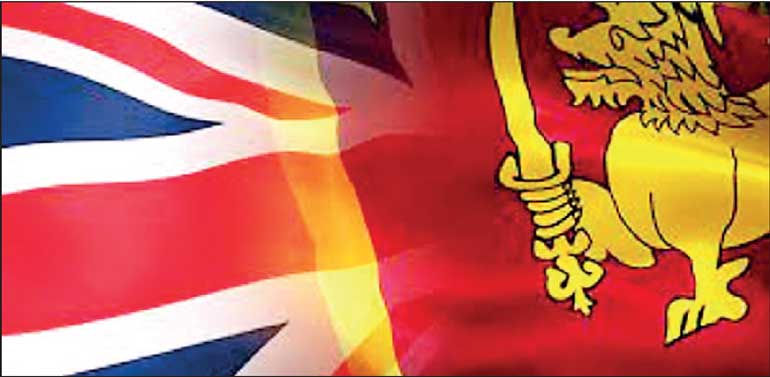Monday Feb 16, 2026
Monday Feb 16, 2026
Monday, 1 July 2024 00:28 - - {{hitsCtrl.values.hits}}

Sri Lanka should advocate for genuine and impactful change from the next UK government while also striving for systemic change within its own country
 The anticipated victory of the Labour Party in the forthcoming general election in the United Kingdom presents a pivotal opportunity for political activists campaigning for a fairer and more sustainable Sri Lanka. This potential shift in power offers a chance to press for significant changes in the global economic order. For Sri Lanka to overcome its external debt crisis and economic difficulties, Labour’s commitment to strengthening and reforming multilateral institutions, tackling corruption and illicit money flows, and supporting the recovery of stolen assets is crucial.
The anticipated victory of the Labour Party in the forthcoming general election in the United Kingdom presents a pivotal opportunity for political activists campaigning for a fairer and more sustainable Sri Lanka. This potential shift in power offers a chance to press for significant changes in the global economic order. For Sri Lanka to overcome its external debt crisis and economic difficulties, Labour’s commitment to strengthening and reforming multilateral institutions, tackling corruption and illicit money flows, and supporting the recovery of stolen assets is crucial.
Over the past 14 years, the Conservative government has shown little favour towards Sri Lanka. When Sri Lanka was struggling to meet its debt obligations and was in its greatest need, the Conservative government offered little assistance, choosing instead to look away. Contributions from the Paris Club have been meagre and came with unfavourable terms. Additionally, Sri Lanka has not been offered a reduction to its overall debt stock (haircut) during debt restructuring negotiations, which has hindered its path to sustainable recovery. The current UK government’s liberal financial policies and light-touch regulation have created an environment that encourages and attracts illicit financial flows to the City of London and its crown dependencies. These policies benefit the UK economy while depriving the Sri Lankan economy of much-needed foreign exchange. This situation underscores the need for a more equitable global economic system, one that the Labour Party should address through genuine reforms.
Trade relations between the UK and Sri Lanka have remained static under the Conservative government.1 No significant direct investments from UK companies have been made, and the UK’s imports of Sri Lankan goods have decreased. This decline highlights the absence of a post-Brexit trade deal that could have helped Sri Lanka access the UK market. The stagnation in trade relations has contributed to the economic challenges faced by Sri Lanka, emphasising the importance of fostering stronger and more beneficial trade partnerships.2
Until very recently, the UK Foreign Office had issued warnings about various risks in Sri Lanka, including shortages of essential resources like food and fuel, frequent power cuts, and potential political unrest. These warnings were based on conditions dating back to 2022, which led to a campaign group arguing that these outdated advisories were unfairly undermining the travel industry.
Moreover, the UK’s distorted labour market is contributing to a brain drain from Sri Lanka. The Conservative government’s policies to attract workers to the care sector have opened avenues for low-paid Sri Lankan workers, exposing them to exploitation by employers. These policies, while addressing labour shortages in the UK, do little to support the well-being and rights of immigrant workers, further perpetuating the cycle of economic injustice.
Encouraged by the government, the UK has become increasingly less welcoming to immigrants. Punitive visa entry requirements deter Sri Lankans from traveling to the UK for business or to visit family and friends. This unwelcoming environment hampers cultural and economic exchange, adding another layer of difficulty for Sri Lankans looking to engage with the UK.
Against this backdrop, the Labour Party’s manifesto raises the question of whether it offers any hope for Sri Lanka or its citizens. By advocating for a fairer and more equitable global economic order, the Labour Party could create opportunities for countries like Sri Lanka to thrive.
Excerpts from the Labour Party manifesto
The Labour Party’s manifesto provides some insight into what can be expected from the next UK government3. Here are some key excerpts:
International Role and National Interest: “With Labour, Britain will once again be strong on the world stage, confident in the pursuit of our national interest, and progressive but realistic about the challenges we face. We will reconnect with allies and forge new partnerships to deliver security and prosperity at home and abroad.”
Britain’s ongoing pursuit of its national interest often perpetuates the exploitation of the global south. Labour can help democratise multilateral organisations, ensure a level playing field for all global economic activity, and reform the global financial architecture to benefit countries beyond the global north.
Multilateral Institutions: “Multilateral institutions remain indispensable, but they are struggling under the strain of new global challenges. Labour will work with allies to build, strengthen, and reform these institutions. We will use the UK’s unique position in NATO, the UN, G7, G20, and the Commonwealth to address the threats we face, and to uphold human rights and international law.”
Labour should acknowledge the role the global north plays in causing ongoing global challenges and undermining the effectiveness of multilateral institutions. They must use the UK’s position to eliminate threats posed to other nations by robustly and fairly upholding human rights and international law.
Corruption and Money Laundering: “Labour will also work with our allies and international financial centres to tackle corruption and money laundering, including in Britain, Crown Dependencies, and in British Overseas Territories.”
Labour should recognise that the UK supports a sophisticated ecosystem for global corruption and money laundering through its financial, legal, insurance, and accountancy sectors. The omission from their manifesto of a wealth tax, better funding for the prosecution service, and stronger enforcement agencies suggests a limited commitment to addressing these issues.
Economic Growth and Foreign Policy: “Labour’s first mission in government will be to grow our economy. This will be at the heart of everything we do, including our foreign policy. We will use our diplomatic network to attract foreign direct investment into the UK, expand markets for British exporters, and shape emerging regulatory frameworks.”
Countries of the global south should ensure that their interactions with the UK result in clear economic benefits for their own economies. Sri Lanka should maximise the use of domestic substitutes to reduce non-essential imports that drain its foreign reserves. Sri Lanka should ensure any UK foreign direct investment brings tangible advantages to its economy, while their exporters and its workers must be guaranteed fair prices for their goods and services.
Commitment to a Liveable Planet: “Our mission statement will be ‘to create a world free from poverty on a liveable planet’ as a signal of our commitment to greater multilateral action, and our intention to lead on this agenda.”
Sri Lanka should closely monitor how Labour’s policies translate into tangible benefits for the global south. Previous pledges and promises have often gone unfulfilled. For instance, climate commitments and the UN’s sustainable development goals have not received adequate funding. The Labour Party manifesto includes policies that continue austerity programs of the Conservatives. While a high level of poverty is expected to continue in the UK under these programs, it is unlikely the Labour Party will take real action to address global poverty.
Sri Lanka and the UK Labour Party
Sri Lanka needs a genuinely sustainable solution to its external debt crisis that supports an industrial strategy enhancing the well-being of its people and environment. The UK is in a unique position to help end the debt crisis faced by many lower-income countries because nearly 90% of the debts to banks, hedge funds, and traders are governed by UK law. The next Sri Lankan Government, backed by a public mandate, along with its civil society organisations, should collaborate with the UK diaspora and campaign groups to influence the Labour Party to adopt more progressive policies to achieve positive outcomes.
Labour’s election slogan is “Change.” Sri Lanka should advocate for genuine and impactful change from the next UK government while also striving for systemic change within its own country.
References:
Primary destination countries, Transparency International: https://knowledgehub.transparency.org/assets/uploads/helpdesk/Helpdesk-answer-for-TI-SriLanka_Destination_Illicit_Money-2021.pdf
Sri Lanka, Trade and Industry Fact Sheet: Government. https://assets.publishing.service.gov.uk/media/66447df4ae748c43d3793b6b/sri-lanka-trade-and-investment-factsheet-2024-05-17.pdf
Labour Party Manifesto 2024: https://manifesto.deryn.co.uk/wp-content/uploads/2024/06/Labour-Party-manifesto-2024.pdf
(The writer is currently a parliamentary candidate for the Green Party at the UK general election and is a former local councillor in London. He is a co-founder of the Institute for Political Economy (www.ipe-sl.org) and could be reached via email [email protected].)